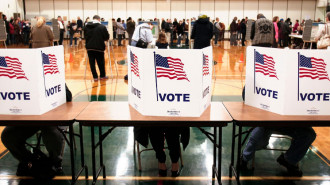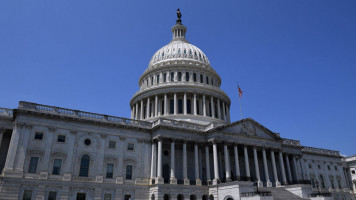Iran: Trump's backtrack sends message to the world to not make deals
Mohammad Javad Zarif also added, speaking to reporters on Saturday, that for French President Emmanuel Macron and German Chancellor Angela Merkel "to try to appease the president (Donald Trump) would be an exercise in futility".
The US will decide whether or not to restore economic sanctions on Tehran by May 12, a decision which could prove to be a severe blow to the 2015 pact. Trump had pressured European allies to work with Washington, and Macron and Merkel are both due to meet with the US president this week.
"The United States has not only failed to implement its side (of the deal), but is even asking for more," said Zarif, who is in New York to attend a UN General Assembly meeting.
"That's a very dangerous message to send to people of Iran but also to the people of the world - that you should never come to an agreement with the United States because at the end of the day the operating principle of the United States is 'what's mine is mine, what's yours is negotiable,'" he said.
Earlier this month, US ambassador to the UN Nikki Haley said that the North Korean leader Kim Jong Un had "looked at the Iran deal, he's seen what he can get and he's seen how he can push through loopholes and we're not going to let that happen again".
Trump has derided the deal as a capitulation to Tehran and has declared it no longer in the US interest to maintain the sanctions relief his predecessor Barack Obama granted Iran in return for controls on its nuclear programme.
He has demanded that US lawmakers and European allies fix "disastrous flaws" in the deal or face a US exit, possibly as early as next month.
Zarif said that Tehran was considering many options should Washington leave the deal, and could restart its nuclear activities.
"We will make a decision based on our national security interests when the times comes. But whatever that decision will be, it won't be very pleasant to the United States," he said.
'Vigorously pursue' nuclear enrichment
About 500 lawmakers from Germany, France and Britain urged the US Congress on Thursday to support the Iran nuclear deal which Trump has threatened to abandon.
When asked if Iran could stay in the deal with the remaining parties, Zarif said: "I believe that's highly unlikely because it is important for Iran to received the benefits of the agreement and there was no way Iran would do a one-sided implementation of the agreement."
"America never should have feared Iran producing a nuclear bomb, but we will pursue vigorously our nuclear enrichment. If they want to fear anything its up to them," Zarif said.
Earlier in the week, EU foreign ministers discussed ways to ensure the US would not pull out of the nuclear deal, but stopped short of agreeing to new sanctions on Tehran.
Any decision on sanctions requires unanimous approval from all 28 EU states and several, including Italy and Sweden, are not convinced about new measures.
But German Foreign Minister Heiko Maas said the question of expanding sanctions would "remain on the agenda" in the coming weeks.
Previously, Iran said the US will "regret" violating the nuclear deal and that the country would respond "within a week" should that happen.
![Palestinians mourned the victims of an Israeli strike on Deir al-Balah [Getty]](/sites/default/files/styles/image_684x385/public/2024-11/GettyImages-2182362043.jpg?h=199d8c1f&itok=xSHZFbmc)


![The law could be enforced against teachers without prior notice [Getty]](/sites/default/files/styles/image_684x385/public/2178740715.jpeg?h=a5f2f23a&itok=hnqrCS4x)
 Follow the Middle East's top stories in English at The New Arab on Google News
Follow the Middle East's top stories in English at The New Arab on Google News


